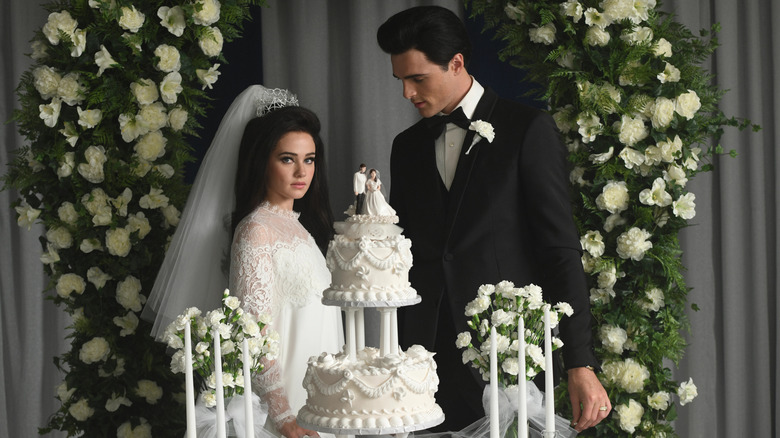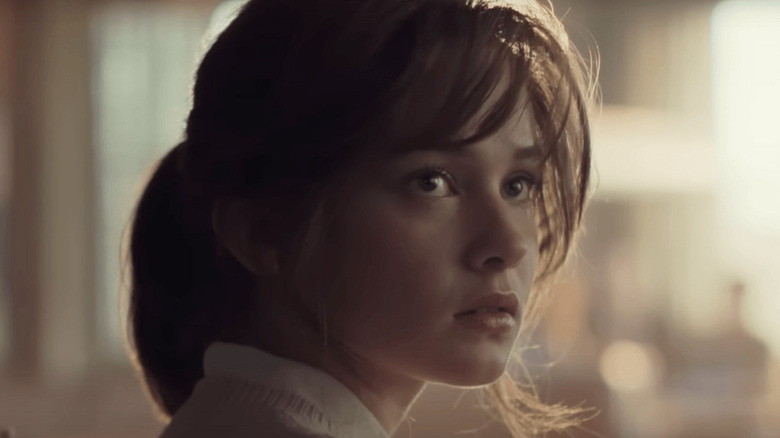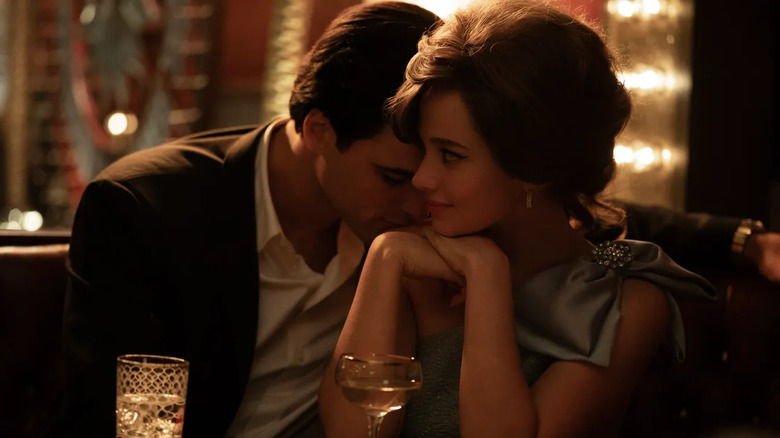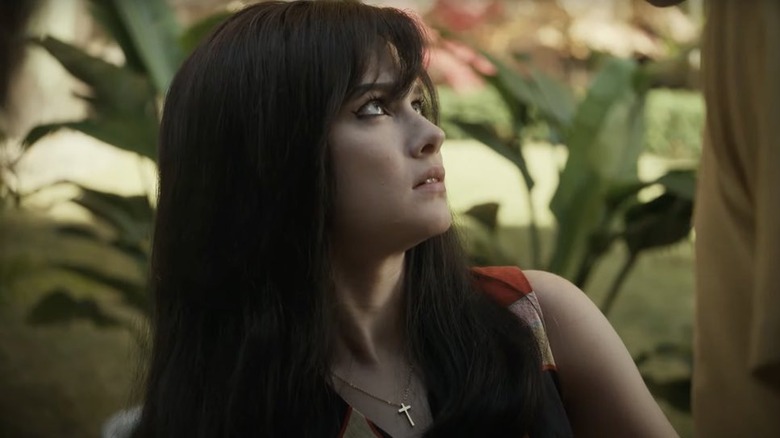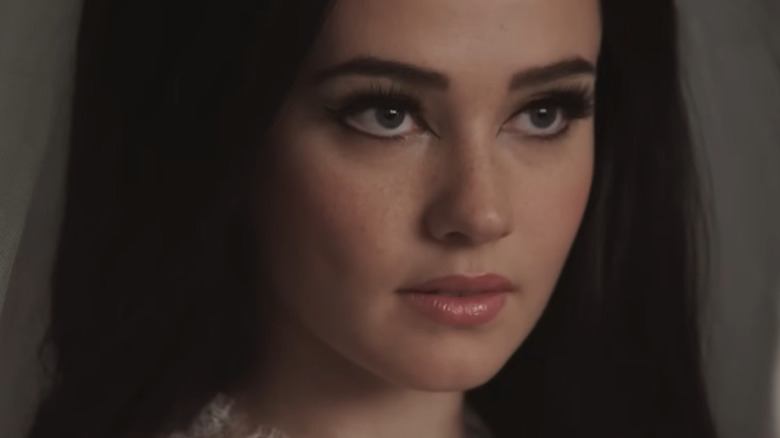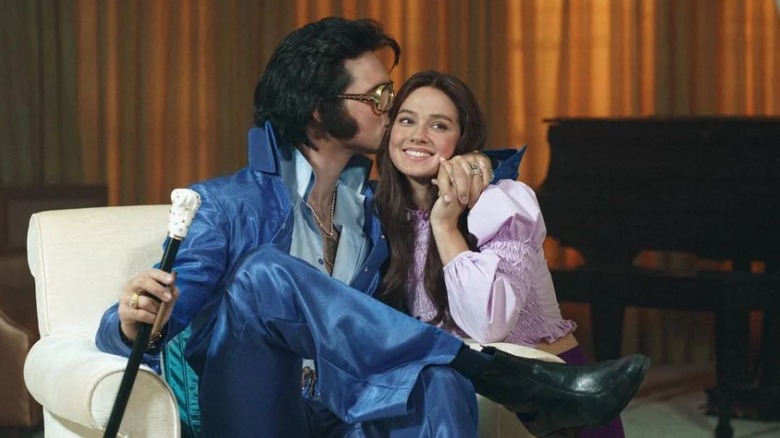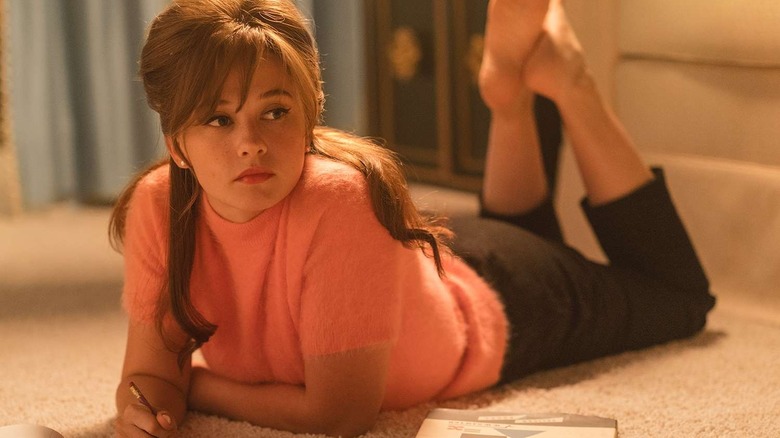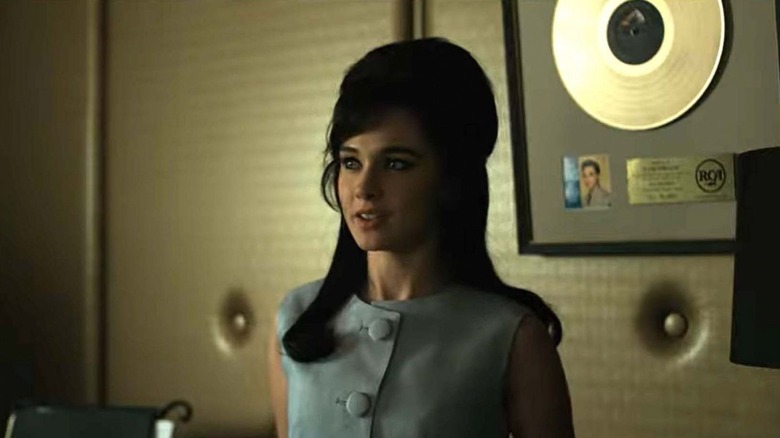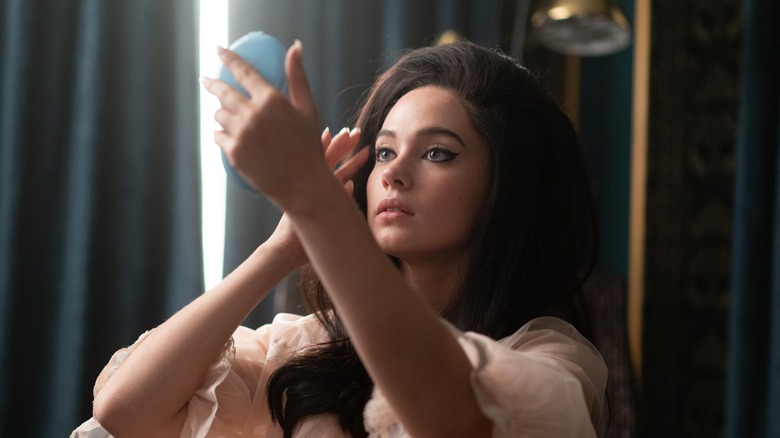The Ending Of Priscilla Explained
Contains spoilers for "Priscilla"
Throughout movie history, certain subjects have caught Hollywood's and the public's interest so much so that not one but two films get made at around the same time. Take "Tombstone" and "Wyatt Earp," "Armageddon" and "Deep Impact," and "The Prestige" and "The Illusionist," just to mention a few. Recently, one such subject has been the complicated life of Elvis Presley. Yet coincidentally, neither film featuring the King is really about him. Baz Luhrman's 2022 biopic, "Elvis," was ostensibly a character study of the titular lead, played by Austin Butler in an Academy Award-nominated role, but its perspective was that of Colonel Tom Parker (Tom Hanks), a complicated figure in his own right. Sofia Coppola's 2023 film, "Priscilla," is a much different movie that takes the perspective of Elvis' young love interest, Priscilla Beaulieu nee Presley (Cailee Spaeny). Still, even in a more supporting capacity, Elvis (Jacob Elordi) is an enormous looming presence.
While "Elvis" is a rousing yet straightforward biopic, "Priscilla" is more of a mood piece. Significantly less happens in Coppola's film, but the result is no less impactful. By choosing to depict Elvis and Priscilla in what amounts to a collage of their most intimate moments, "Priscilla" might have more to say. It's matter-of-fact about the lives of its two lead characters, but it's thought-provoking in how it engages the viewer from there. Coppola's script, based on an autobiography by Priscilla herself and Sandra Harmon, is light on dialogue, but the film is heavy on beautifully composed images. The story invites (but really coerces) the audience to come to their own conclusions about the nature of the couple's unusual relationship. And it's got one of the most satisfying endings of any film this year. To understand why and what it all means, here's the ending of "Priscilla" explained.
What you need to remember about the plot of Priscilla
"Priscilla" starts abruptly as Elvis' friend Terry (Luke Humphrey) approaches Priscilla at a cafe in West Germany in 1959. He asks her if she's a fan and if she'd like to attend one of his parties. Priscilla would, but first she needs the permission of her parents (Dagmara Domińczyk and Ari Cohen). They're hesitant, but they relent, and Priscilla is whisked away to meet her idol. In their very first conversation, she reveals that she's only 14 years old and in ninth grade. Elvis so enjoys her company that he invites her back a second time, and the two begin a romantic yet innocent-seeming relationship.
Months later, Elvis returns to the United States. When Priscilla doesn't hear from him, her mother suggests she move on. Shortly after her 16th birthday, he calls and invites her to stay with him at Graceland. During her trip, he introduces her to uppers and downers, and the two go on a whirlwind and drug-fueled (though mostly chaste) trip to Las Vegas. Priscilla reluctantly returns to West Germany but is thrilled when Elvis offers to let her live with him; he promises her parents he'll enroll her in a good Catholic school and see that she graduates.
Life at Graceland is an adjustment. The home is beautiful, he's gifted her a puppy, and she wants for nothing. But there are also hard and implied rules to abide by, and Elvis is rarely around. As the role Priscilla is expected to play becomes clearer to her, she becomes disillusioned with having a handsome celebrity for a boyfriend.
What's going on with Elvis and Priscilla's relationship?
When Elvis first meets Priscilla, he tells her that he enjoys talking to someone from home and that he wishes his mother could've met her because Mrs. Presley would've liked her. He tells Priscilla's father that she's mature beyond her years, even though her family and his posse regularly point out how young she is. Their relationship is definitely more than platonic. They kiss and cuddle, he buys her gifts (like the gold watch she wears throughout the movie), and he professes his love for her above other women. But he never promises to be exclusive with her, and he refuses to sleep with her. His excuse is that he wants this final step between them to be "sacred."
Though it's not explicitly explained, Elvis likely regularly sent Terry out looking for underaged girls. He's engaging in sexual affairs with adult women throughout his relationship with Priscilla. Their dynamic serves another purpose: One interpretation might be that Elvis won't have sex with Priscilla until she's of age, to protect himself from scandal. Another interpretation could be that he doesn't view her as a sexual object so much as a symbol of simplicity and innocence. It's telling that he leaves the puppy in a tiny white picket fence. Priscilla is essentially his pet, or more accurately, his doll. He picks out her clothes, styles her hair and makeup, and even tells her that her job is to stay in his dollhouse-like mansion awaiting his beck and call. When she starts to question him and ask for more autonomy, it's the beginning of the end.
How does Priscilla end?
Priscilla realizes that being with Elvis means enduring his every whim, including violent outbursts, obsessions, an ever-increasing dependence on drugs, and tabloid-publicized infidelity. After she and Colonel Parker put an end to his interest in spiritualism and after he apologizes for his tryst with Ann-Margret, Elvis proposes. Crucially, he doesn't ask. "We're getting married," he announces as he presents her with a ring. It's 1967; Elvis and Priscilla have been involved for nearly a decade by now, and the viewer gets the sense that the wedding isn't the blissfully happy, magical occasion the young bride thought it would be.
Within the year, Priscilla is pregnant. As she delivers and raises baby Lisa Marie (played both by Raine Monroe Boland and Emily Mitchell), she and Elvis grow distant. His TV special is a hit, and his comeback tours still sell out, but there's a discernible has-been quality to Jacob Elordi's performance as he pines for and tries to force himself on his wife in a hotel room. Priscilla starts to make decisions for herself. She stays in Los Angeles with her daughter. She reverts to the light brown hair and natural makeup she preferred before Elvis dictated otherwise. She takes martial arts classes and makes new friends. Eventually, she tells him she's leaving. He wonders if he's lost her to another man, but she tells him he's lost her to a life of her own.
"Priscilla" ends as abruptly as it began, as the titular heroine surveys what was her life at Graceland and says goodbye to the people who were her surrogate family ... namely Elvis' staff and his grandmother (Lynne Griffin). She drives through the gates, leaving her old life and the paparazzi behind as Dolly Parton's version of "I Will Always Love You" plays.
Where does the ending leave the characters?
Notably — and unusually for a biopic — "Priscilla" doesn't end with any title cards that summarize what else happened after the credits roll. The film concludes with Priscilla's decision to leave and merely hints at what's to come for both of its main characters. Prior to her request, Elvis really did ask for a trial separation, as shown in the movie, during the period when his wife was pregnant with their child. They quickly reconciled and remained together for five more years. But by 1972, Priscilla was ready to move on. She did have a relationship with her karate teacher (Evan Annisette), which is alluded to in the film by their familiar social interactions with each other after class.
Coppola's retelling doesn't extend to the most headline-worthy event of the narrative — Elvis' untimely death in 1977. But the pace at which he seems to be declining portends a tragic fate for the King of Rock 'n' Roll. He was only 42 years old when he succumbed to a heart attack, likely the result of the barbiturates he had been taking. In the intervening years, Elvis and Priscilla co-parented amicably. She attended his funeral. Lisa Marie was just 9 years old when she lost her father. She went on to find fame as a musician and, infamously, as the wife of another pop culture legend, Michael Jackson. Lisa Marie also died tragically, at age 54, just after "Elvis" premiered and just before "Priscilla" would come out.
At the time of writing, Priscilla Presley is 78 years old and is currently taking part in the press tour for "Priscilla."
What does the ending of Priscilla mean?
With "Priscilla," Sofia Coppola tells the specific story of Priscilla Presley's time as Elvis' young love interest and bride as well as a much more universal story about power differentials within unhealthy and abusive relationships. The film doesn't make excuses for the iconic rock and roller's sordid behavior, but it doesn't take a finger-wagging stance about it either. Instead, Coppola allows the viewer to experience the toxic romance just as Priscilla did, which is itself a powerful commentary on the grooming process.
Luring a 14-year-old Priscilla into an entanglement with a 24-year-old Elvis is incredibly easy. He's one of the most famous and desirable people on the planet, and he wants to date her; she can't believe her luck. But the Elvis that we see in the movie — and that Priscilla saw, as she was largely kept away from his public life — isn't the coifed and costumed crooner. Yes, the cameras and crowds linger just outside the gates, but Coppola's Elvis is just another abusive partner ... a master manipulator who feigns tenderness but is actually a monster whenever he isn't indulged, which is something all too many people can relate to.
The longer Priscilla is with him, the more she gets to know the real Elvis. He tightly controls her schedule, her appearance, and even her mental state, through the use of pharmaceuticals. He won't hesitate to strike her or throw something at her if he has the impulse. When she realizes that she's sacrificed her autonomy for this distorted dream, a more mature Priscilla has the courage to leave the marriage.
How close to the real story is Priscilla?
"Priscilla" is based on the 1985 memoir, "Elvis and Me," written by Priscilla Presley and Sandra Harmon. The book was made into a two-part TV movie that aired in 1988. Sofia Coppola was a fan of Presley's biography, and after rereading "Elvis and Me," she sought to put her own spin on the captivating story. Presley and Harmon have writing credits for their source material, and this time, Coppola brought on Presley as an executive producer.
The 2023 movie changes the title to "Priscilla" to orient the focus squarely on the protagonist. Otherwise, it's incredibly accurate, if more narrow in scope and often more visual than verbal. In her memoir, Presley asserts that Elvis gave her speed while she was a student in Germany and sleeping pills once she arrived in Graceland. He also insisted they wait until their wedding night to have intercourse, though they were intimate in other ways together. And he really did control nearly every aspect of her life as he was carrying on affairs with other women — famous and not — throughout their relationship ... all of which Priscilla Presley realized as time went on. The extent of his drug use and his temper are true to life, as are smaller details like his fleeting interest in spiritualism and his tendency to wake late in the afternoon.
There are, of course, omissions for time and minor inconsistencies, like the fact that Priscilla lived with Elvis' father, Vernon (Tim Post), and Vernon's second wife, Dee (Stephanie Moore), before moving into Graceland. But on the whole, "Priscilla" is a faithful and compassionate adaption of the real Priscilla's book and life.
Why isn't any of Elvis' music in the movie?
Anyone who's seen both films knows that 2022's "Elvis" and 2023's "Priscilla" couldn't be more different. One's about the husband. The other's about the wife. One's a fast-paced summary of Elvis' whole life. The other's an impressionistic examination of a span of 13 years. But most obviously, one features the extremely recognizable song catalog of Elvis Presley. The other does not. Why aren't any of Elvis' many hits in "Priscilla"? There's a practical answer as well as a thematic one.
Randall Poster and Thomas Mars (husband of Sofia Coppola), who collaborated to provide the music for "Priscilla," told Variety how the film's unique sound came to be. Getting the rights to Elvis' library is complicated since his family as well as a third-party company manage his estate and musical library. In the end, the filmmakers weren't given permission to use any of the songs (perhaps because "Priscilla" was expected to paint Elvis in a less-than-flattering light, though that's not been confirmed by the rights holders or the filmmakers).
Instead, Poster and Mars chose to design a score and soundtrack that combined some of Elvis' public domain titles with beloved tunes from multiple eras as well as some original work. Anachronistic needle drops are a signature of Coppola's. So are feminist flourishes. Not only does the exclusion of his voice make Elvis seem like more of a man than a myth, but the inclusion of Dolly Parton's "I Will Always Love You" at the end is a meaningful Easter egg. Elvis wanted the rights to the song Parton wrote for him, but she refused and recorded a version herself.
What have the cast and crew said about Priscilla?
Sofia Coppola was drawn to Priscilla Presley for the same reason she was drawn to Marie Antoinette. "I was just so interested in Priscilla's story and her perspective on what it all felt like to grow up as a teenager in Graceland," she told Vogue. "She was going through all the stages of young womanhood in such an amplified world — kinda similarly to Marie Antoinette." Coppola may have wanted to make Graceland another Versailles, but the writer-director had a limited budget. "Not everything can be quite as epic as it was in Priscilla's real life, so we have to recreate it in a crafty way," she explained. Nevertheless, she wanted to make sure she nailed the 1960s Americana glamour.
Coppola admitted that she and Presley only met a few times but that she was a supportive resource, especially to Cailee Spaeny. For her part, Presley told a press conference at the Venice Film Festival (via The Hollywood Reporter) that it was "difficult to watch" the film adaptation of her and Elvis' relationship, but that Coppola "did her homework."
Spaeny told /Film that, though she's in nearly every frame of the movie, she and co-star Jacob Elordi laughed early on about how many more lines he had. But the point of the movie was to finally free Priscilla from Elvis' shadow. "The fact she doesn't speak that much says something about her life and her relationship with this man and her journey with him," she said, before adding that Priscilla eventually figured out she wanted more from life than Elvis.
